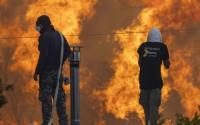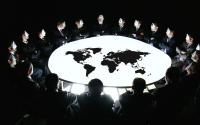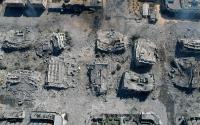Michael HarrisWednesday August 28, 2002
Two days ago I returned from my third visit to Israel in the past four months. On this visit, I was accompanied by my two daughters, aged 11 and nine. Their company intensified the deep feelings of joy and pride that I invariably experience in the Holy Land. After two millennia of bloodstained exile, it is exhilarating for any Jew with a sense of history to walk through the streets of a sovereign Jewish state, to imbibe the sounds of the reborn language of the Bible, to witness the fulfilment of the prophetic promise that one day our children would again play in the streets of Jerusalem.
Yet on any current visit to Israel, these idyllic sensations are blunted by the realities of what Israelis refer to as "the situation". Because of the danger of suicide bombs and other attacks, I felt it necessary to avoid taking my children on buses and to omit from our programme some of my favourite Jerusalem haunts, such as the Ben Yehuda pedestrian mall in the centre of the city, the scene of several deadly recent assaults.
Human rights matter, and to be able to live is the most basic human right of all: to walk the streets freely, to travel without fear, to have a coffee or meal out with friends without being maimed or murdered simply because of who and what you are. That right, in the post-Holocaust era above all others, applies to Jews as well. Only major attacks on Israelis are reported in the media. Many people are unaware that, since the beginning of the current troubles in the Holy Land, Israel has suffered literally thousands of acts of terror against its citizens.
To ask Israel to do nothing to protect its people from daily attempts to harm them is as morally repugnant as it is ludicrous. One can imagine what the response of the British military and police would be if, God forbid, suicide bombers had been regularly killing people in the centre of London, Manchester and Birmingham, with a particular penchant for striking at the rush hour. Yet the precise equivalent is what many have expected Israel to tolerate. If a Jew is pricked, he or she bleeds. If Israel has no right to self-defence, then no country on earth has that right. If the Jewish people has no right to protect itself, then no people in the world has that right.
However, the right to self-defence, crucial though it is, does not mark the limit of the moral horizon for either traditional Judaism or for the overwhelming majority of Israelis. It is the value of peace - shalom is one of the Hebrew names of God - and the striving for its realisation that constitutes the central political concern of Israeli society. One of the most beautiful places in Israel is Beit Gavriel, on the shores of the Sea of Galilee, where part of Israel's peace treaty with Jordan was signed and which is earmarked as the venue for the signing of a future peace agreement with Syria. (One wonders whether there is a building with a similar purpose on the Syrian side of the border).
Both in the British Jewish community and in the wider national arena, it is the voice of the chief rabbi, Professor Jonathan Sacks, that has in recent months provided probably the most sustained, powerful and articulate reminder of the essential justness of Israel's cause. As reported in yesterday's Guardian, the chief rabbi has now drawn attention to the moral dangers inherent in a situation of prolonged conflict such as that between Israel and the Palestinians.
He is right to do so. As far as religiously aware Jewish exponents of moral values are concerned, justice, compassion and sensitivity are not merely liberal western ideals grafted on to the fabric of faith. Rather, moral concerns and empathy with the suffer ing of others are rooted in the deepest layers of Jewish tradition and belief. It is the Hebrew Bible that first taught us to see in other human beings the image of God. In the 12th century, Maimonides, the greatest Jewish philosopher of the Middle Ages, described the purpose of the Torah as the fostering of mercy, compassion and peace in the world. That is why, despite the healthy diversity of political opinion concerning Israel in the British rabbinate, I am happy to be one of several Orthodox rabbis who support Prof Sacks's wise words of caution concerning Israel's current situation.
In the Book of Chronicles, God tells David that he may not build the Temple because of the blood that he has spilled. Maimonides argued that David's wars were morally justified; nevertheless, he explains, the very fact that David took human life itself invalidates him for the task of constructing the House of God. Even the justified, coerced imposition of suffering on others is morally corrosive. The chief rabbi is right to warn that, in the long term, Israel has no authentically Jewish alternative but to find another way.
· Dr Michael Harris is an Orthodox rabbi. His congregation is the Hampstead Synagogue, London






